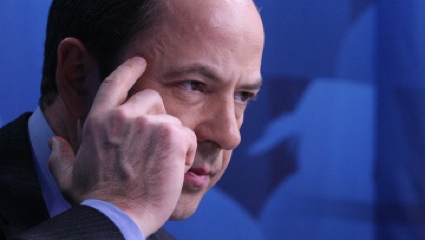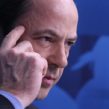
Ukraine’s Ruling Party Faces Defections
Publication: Eurasia Daily Monitor Volume: 11 Issue: 34
By:

The Ukrainian authorities and the mainstream opposition leaders signed a deal today (February 21) in Kyiv to settle the political crisis continuing since November. They agreed to undertake constitutional reform, form a coalition government, conduct early presidential elections by December and, most importantly, put an end to the violence (Kyiv Post, February 21). The deal reflects the building pressure President Viktor Yanukovych’s government has been under in recent days and weeks caused by escalating street violence, which culminated with a number of high-level and parliamentary defections from the ruling party. Several people’s deputies have quit Ukraine’s ruling Party of Regions (PRU) since the start of the mass anti-government protests in Kyiv last November. But the exodus has accelerated in response to the outbreak of violence on February 18–20, when at least 77 protesters and policemen were killed. The PRU has consequently significantly reduced its comfortable majority in parliament, which it has controlled since early 2010 jointly with its allies, the Communist Party.
However, the PRU is unlikely to split or lose its prominent position in Ukrainian politics in the short to medium term. Most of those who have left the PRU faction in parliament by midday February 21 were rather fellow travelers who joined the ruling party in order to pursue their career goals and business interests. The Donetsk Region core of the party apparently remains intact. Also, those deputies who have expressed disagreement with the party’s line on the protests, like former presidential candidate Serhy Tyhypko, do not intend to leave it but are rather pursuing their own ambitious goals within the party.
Deputies started to defect from the PRU faction in early December, when three members of parliament (MP) quit in protest against the brutal dispersal of a peaceful pro-European protest in Kyiv’s Independence Square on November 30. On February 20–21, at least 20 deputies said they would quit the PRU faction. Also two of Yanukovych’s key allies have left him. Serhy Levochkin, who headed the presidential administration since Yanukovych’s election in 2010, submitted his resignation reportedly in early December and was replaced with Andry Klyuyev on January 24 (liga.net, January 24). On February 20, Volodymyr Makeyenko, who was recently appointed as Kyiv city administrator, quit the PRU. He also showed his disobedience to Yanukovych by restarting the subway, whose service was suspended on February 18, apparently in order to disrupt supplies to the protesters’ camp (5 Kanal TV, February 20).
Although the defections made the PRU faction numerically smaller and weakened Yanukovych personally, their significance should not be overestimated. Most of the defectors joined the faction in recent years and were not senior MPs. As for Makeyenko, he joined the PRU about ten years ago, after defecting first from the communists, then from the socialists and then from the nationalists. Born and educated in Russia, he has never been close to the PRU’s Donetsk core (https://file.liga.net/person/245-vladimir-makeenko.html).
Tyhypko is a special case. He was viewed by many as a successor to then-president Leonid Kuchma in the early 2000s, but Kuchma preferred Yanukovych. After his surprising performance in the 2010 election, when he came in third after Yanukovych and then–prime minister Yulia Tymoshenko, Tyhypko disbanded his own party and joined the PRU, harboring ambitions to become the party chairman (UNIAN, September 10, 2011). However, he was demoted to secondary roles in the government and had to return to parliament in 2012.
On February 20, Tyhypko said on his Facebook page that Speaker Volodomyr Rybak should be replaced with someone from the opposition and that a new prime minister should be urgently appointed. He said the authorities lost control over the situation. Tyhypko was also among the initiators of the urgent parliament meeting on the same day, which issued a resolution condemning the use of force against the anti-government protesters, and outlawed the “anti-terrorist” operation declared by the security service (see Hot Issue – Ukrainian Protests and the Armed Forces: Will the Military Stay in Its Barracks?, The Jamestown Foundation, February 20). However, neither Tyhypko nor other PRU deputies who backed the resolution said they would quit the PRU. Later on, Tyhypko posted that there was a group of 31 people within the PRU faction with a “special position,” but he noted the group was not going either to quit the PRU or to back Yanukovych’s impeachment.
Tyhypko, who is reportedly linked to Levochkin, may become the leader of the PRU’s liberal wing. He may eventually become the leader of the PRU, if Yanukovych’s Donetsk core is demoralized by what currently looks like a defeat of the party’s hardliners due to the failure to suppress the mass protests.
Separately from Tyhypko, a group of 12 deputies issued a statement on February 20, urging a return to the 2004 constitution, which Yanukovych’s team abolished in 2010 in order to strengthen his presidency. They voiced their “support for the Ukrainian people,” and called on “both sides” to stop the bloodshed, thus dissociating themselves from the government (Ukrainska Pravda, February 20). Also in this case, the signees did not say they would quit the PRU faction, and most of them are rather businessmen who bandwaggoned with the PRU in 2010–2012 in order to further their business interests.
On February 21, Vitaly Khomutynnyk said on his Facebook page that he has also decided to quit the PRU. This is, indeed, a real blow to the PRU, as Khomutynnyk—although only in his late thirties—is one of those Donetsk politicians who have been in the leading positions in the PRU since its creation. In parliament, Khomutynnyk chairs the influential committee for taxation. The PRU will be seriously weakened if more people from its old guard, like Khomutynnyk, head for the exit. Support for the PRU from Ukraine’s richest businessman and Yanukovych’s long-time ally Rinat Akhmetov is also essential. Thus far, there have been no indications from Akhmetov that he disagreed with Yanukovych.




